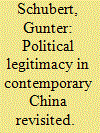|
|
|
Sort Order |
|
|
|
Items / Page
|
|
|
|
|
|
|
| Srl | Item |
| 1 |
ID:
131638


|
|
|
|
|
| Publication |
2014.
|
| Summary/Abstract |
In the first part of this article the author comments on Peter Sandby-Thomas' contribution and critically assesses his suggestion to focus on 'legitimation' instead of 'legitimacy' when investigating the Chinese political system. In the second part, the author, in an effort to refine his analytical model to study legitimacy presented in an earlier article published in this journal, argues for combining Eastonian systems analysis and policy analysis, particularly at the local level of the Chinese state. The systematic accumulation of knowledge on local policy implementation with regard to procedure, output effectiveness and public responses, undertaken from an Eastonian perspective, provides China scholars with a fruitful approach to the study of legitimacy even if some methodological pitfalls remain.
|
|
|
|
|
|
|
|
|
|
|
|
|
|
|
|
| 2 |
ID:
107466


|
|
|
|
|
| Publication |
2011.
|
| Summary/Abstract |
An attack with Bacillus anthracis ("anthrax") is a known threat to the United States. When weaponized, it can cause inhalation anthrax, the deadliest form of the disease. Due to the rapid course of inhalation anthrax, delays in initiation of antibiotics may decrease survival chances. Because a rapid response would require cooperation from the public, there is a need to understand the public's response to possible mass dispensing programs. To examine the public's response to a mass prophylaxis program, this study used a nationally representative poll of 1,092 adults, supplemented by a targeted focus on 3 metropolitan areas where anthrax attacks occurred in 2001: New York City (n=517), Washington, DC (n=509), and Trenton/Mercer County, NJ (n=507). The poll was built around a "worst-case scenario" in which cases of inhalation anthrax are discovered without an identified source and the entire population of a city or town is asked to receive antibiotic prophylaxis within a 48-hour period. Findings from this poll provide important signs of public willingness to comply with public health recommendations for obtaining antibiotics from a dispensing site, although they also indicate that public health officials may face several challenges to compliance, including misinformation about the contagiousness of inhalation anthrax; fears about personal safety in crowds; distrust of government agencies to provide sufficient, safe, and effective medicine; and hesitation about ingesting antibiotic pills after receiving them. In general, people living in areas where anthrax attacks occurred in 2001 had responses similar to those of the nation as a whole.
|
|
|
|
|
|
|
|
|
|
|
|
|
|
|
|
|
|
|
|
|